Foreign policy as a tool of economy
Adelina Marini, September 16, 2010
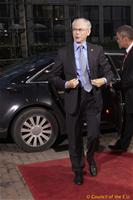 Foreign policy has always been on the agenda of the European Councils (the summits of the leaders of EU Member States), but in most cases - as last points. Exceptions were made for big events or, unfortunately, for disasters somewhere around the world. With the entering into force of the Lisbon Treaty, however, which cleared the way for the creation of the first in EU's history service, dealing entirely with the external affairs of the Union, the balance is gradually starting to shift. In support of this shift, the president of the European Council Herman van Rompuy has organised an extraordinary European Council, dedicated entirely on the Union's external relations.
Foreign policy has always been on the agenda of the European Councils (the summits of the leaders of EU Member States), but in most cases - as last points. Exceptions were made for big events or, unfortunately, for disasters somewhere around the world. With the entering into force of the Lisbon Treaty, however, which cleared the way for the creation of the first in EU's history service, dealing entirely with the external affairs of the Union, the balance is gradually starting to shift. In support of this shift, the president of the European Council Herman van Rompuy has organised an extraordinary European Council, dedicated entirely on the Union's external relations.
The idea of this summit is Member States' leaders to discuss how the European Union should organise itself so that it could realise its old ambition to be an effective global leader. So far the main problem of the Union was that it was a serious economic player on the global scene, but when it comes to its role in solving big conflicts like in the Middle East, Afghanistan or Africa, its word remains unheard. And backstage, usually the various in strength, voices of Member States are being heard.
The summit is attended by EU foreign ministers too and the main issues in the discussions would be how important strong economy is and the internal cohesion in order to enhance Union's ability to project its influence globally.The main tools at Community's disposal are the common security and defence policy, accompanied by a set of tools for crisis management. Last but not least would be the argument that the EU is the largest donor of development aid, as well as the largest trade partner.
The objective of today's summit would be finding a way the Union to benefit as 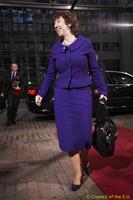 much as possible from its strategic partners, given that this autumn there are several summits to take place with part of them - China, South Korea, Asian-EU summit in October and with India.
much as possible from its strategic partners, given that this autumn there are several summits to take place with part of them - China, South Korea, Asian-EU summit in October and with India.
And as foreign policy has always walked hand in hand with economy another focus of the session would be the G20 summit in Seoul in November, which will take stock of global economic recovery and how the implementation of G20 members' commitments is going on.
This summer the EU fell in quite an awkward situation when, in spite of the entering into force of the Lisbon Treaty, the planned regular summit in Europe did not take place because the White House administration was at odds whom president Obama should talk to - whether president Van Rompuy, the Commission president Barroso or the leader of the country holding the rotation presidency of the EU (then it was Spain). Although it is still not clear whether president Barack Obama is aware whom to talk to, such a summit will take place in Lisbon, though in the framework of the NATO summit. Main topic will be transatlantic economic relations and joint work on major international issues.
In the end of the year the annual climate change conference will take place in the Mexican city of Cancun. Last year the Copenhagen conference also ended not quite well for the EU because the Community was shifted away by bilateral agreements between the US and China and it did not succeed in imposing itself as a global leader in the fight against climate change, no matter the fact that through the entire year before the conference the Union invested huge efforts to reach a compromise.
EU leaders and their foreign ministers started gathering around 0930 CET in the building of the Council in Brussels. A large part of them looked in good mood and were eager to respond to the questions of media. Even Prime Minister Boyko Borissov stopped by to talk to the Bulgarian correspondents, but regretfully we did not succeed in hearing his words because in that very moment HR Lady Ashton also arrived and Mr Borissov greeted her.
The German chancellor Angela Merkel and her first diplomat Guido Westerwelle said that the strategic partnership between the EU and China is of great importance. China is of great significance for the EU, especially against the backdrop of the extremely fast growing global influence of the Asian giant on global stage. China is also an important trade partner for the Community. Besides, China-EU relations are not oppressed in the way the Sino-American relations (China holds an enormous quantity of dollars as a currency reserve in its national bank; it supports the exchange rate of its currency the yuan and has its own opinion on issues like climate change, trade liberalisation and the hot spots around the world). Probably it is not a coincidence that during the selection of ambassadors for 29 EU Delegations around the world, a German has been sent to head the EU mission in Beijing.
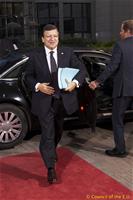 Other EU representatives mentioned, on their way into the Council, that the repatriation to Bulgaria and Romania of Roma citizens of both countries will be discussed. The issue, however, is not expected to be a major one. An interesting fact is that already in the hall, where usually the leaders gather in groups to discuss informally different issues, the French President stopped for a chat with Prime Minister Boyko Borissov via an interpreter. Unfortunately we were unable to hear what they were talking about. Nicolas Sarkozy was tapping the premier on his shoulder all the time but both seemed serious. Whether they have discussed the issue with Bulgarian Roma we will understand after the summit, expected in the late afternoon.
Other EU representatives mentioned, on their way into the Council, that the repatriation to Bulgaria and Romania of Roma citizens of both countries will be discussed. The issue, however, is not expected to be a major one. An interesting fact is that already in the hall, where usually the leaders gather in groups to discuss informally different issues, the French President stopped for a chat with Prime Minister Boyko Borissov via an interpreter. Unfortunately we were unable to hear what they were talking about. Nicolas Sarkozy was tapping the premier on his shoulder all the time but both seemed serious. Whether they have discussed the issue with Bulgarian Roma we will understand after the summit, expected in the late afternoon.
Over lunch EU leaders will hear the oral report of Herman van Rompuy on the work of the task force he heads on the economic governance of the Union.
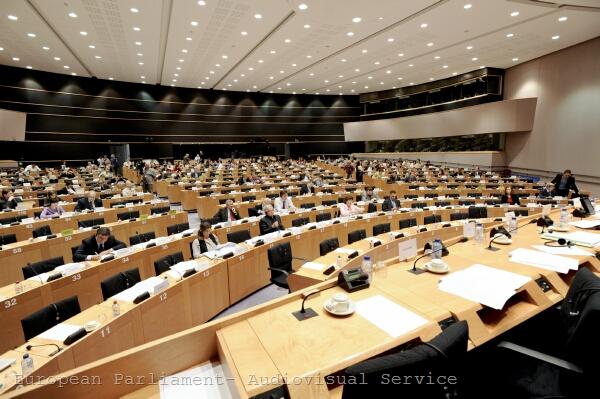 | © European Parliament- Audiovisual Service
| © European Parliament- Audiovisual Service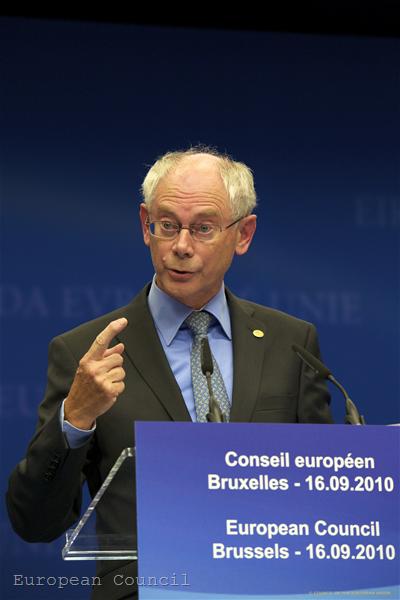 | © European Council
| © European Council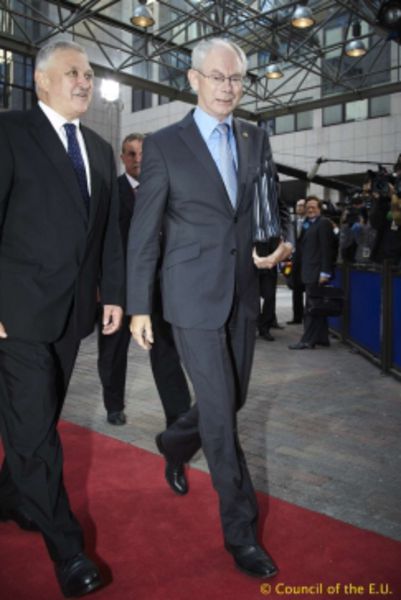 | © The Council of the European Union
| © The Council of the European Union